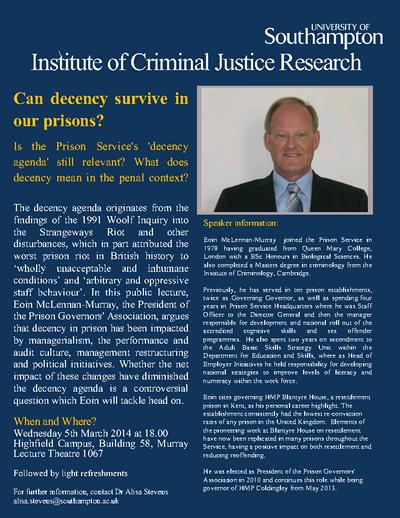Can decency survive in our prisons? Event
- Time:
- 18:00
- Date:
- 5 March 2014
- Venue:
- Highfield Campus, Building 58, Murray Lecture Theatre 1067
For more information regarding this event, please email Dr Alisa Stevens at alisa.stevens@soton.ac.uk .
Event details
Public Lecture: Eoin McLennan-Murray
Is the Prison Service's 'decency agenda' still relevant?
What does decency mean in the penal context?
The decency agenda originates from the findings of the 1991 Woolf Inquiry into the Strangeways Riot and other disturbances, which in part attributed the worst prison riot in British history to ‘wholly unacceptable and inhumane conditions and 'arbitrary and oppressive staff behaviour'. In this lecture, Eoin McLennan-Murray, the President of the Prison Governors' Association, argues that decency in prison has been impacted by managerialism, the performance and audit culture, management restructuring and political initiatives. Whether the net impact of these changes have diminished the decency agenda is a controversial question which Eoin will tackle head on.

Speaker information
Eoin joined the Prison Service in 1978 having graduated from Queen Mary College, London with a BSc Honours in Biological Sciences. He also completed a Masters degree in criminology from the Institute of Criminology, Cambridge.
Previously, he has served in ten prison establishments, twice as Governing Governor, as well as spending four years in Prison Service Headquarters where he was Staff Officer to the Director General and then the manager responsible for development and national roll out of the accredited cognitive skills and sex offender programmes.
He also spent two years on secondment to the Adult Basic Skills Strategy Unit within the Department for Education and Skills, where as Head of Employer Initiatives he held responsibility for developing national strategies to improve levels of literacy and numeracy within the work force.
Eoin cites Governing of HMP Blantyre House, a resettlement prison in Kent as his personal career highlight. The establishment consistently had the lowest re-conviction rates of any prison in the United Kingdom. Elements of the pioneering work at Blantyre House on resettlement have now been replicated in many prisons throughout the Service, having a positive impact on both resettlement and reducing reoffending.
He was elected as President of the Prison Governor's Association in 2010 and continues this role while being governor of HMP Coldingley from May 2013.